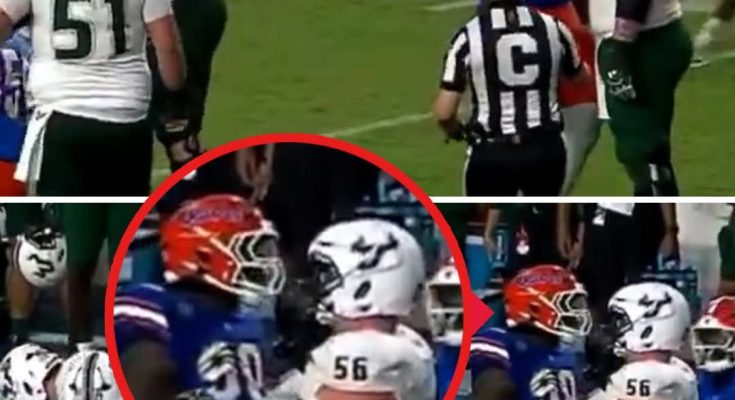Florida’s home game against South Florida became unforgettable for all the wrong reasons—not because of a spectacular play, but rather because of a moment of unsportsmanlike conduct by defensive tackle Brendan Bett. Late in the fourth quarter, with Florida clinging to a precarious lead, Bett allegedly spat directly into the facemask of South Florida guard Cole Skinner following a Bulls rushing play. The referees immediately penalized Bett with an unsportsmanlike‑conduct flag and ejected him. That 15‑yard penalty, awarded as an automatic first down, brought South Florida significantly closer to Florida’s end zone, setting up a field‑goal opportunity that would ultimately decide the game‑15 with just over two minutes remaining. South Florida started their drive at their own 11‑yard line. Two plays later, Bett’s spitting incident occurred, transforming the situation entirely—bringing the ball to USF’s 39‑yard line with a fresh set of downs and just enough time remainingThe Bulls then executed an efficient 8‑play, 87‑yard drive, capping it off with a game‑winning 20‑yard field goal by Nico Gramatica as time expired
It was a dramatic conclusion, one that Florida fans—and certainly the coaching staff—viewed in frustration. Head coach Billy Napier denounced Bett’s actions as “unacceptable,” criticizing the lack of discipline and selfishness that compromised the team’s performance in the most critical moment This incident came at a particularly volatile moment for the Gators: Napier’s team now sits at 1‑1, continuing a pattern of early‑season struggles and calls for improvement in execution and composure
What made this moment especially noticeable was its eerie resemblance to a high‑profile incident just days earlier in the NFL: Philadelphia Eagles defensive tackle Jalen Carter was ejected for spitting on Cowboys quarterback Dak Prescott. Bett’s act appeared, to many, as a reckless copycat move—one that cost Florida dearly
Breaking down what happened—starting with Bett’s decision in the heat of the moment—he misjudged how quickly the referees would react. Most unsportsmanlike penalties might result in a 15‑yard setback, but in this case, because it occurred after the play, the penalty gave USF an automatic first down, drastically altering the game state. Already on defense, Bett’s effort to intimidate or retaliate backfired spectacularly.
That ejection sparked a sequence the Gators simply could not recover from. On the very next play, Bulls quarterback Byrum Brown connected on a 29‑yard screen, exploiting Florida’s suddenly disorganized defense and launching them into field‑goal range with under two minutes remainingThey then ran down the clock inside the 10‑yard line, setting up Gramatica’s game‑winner.
Florida’s season now hangs in the balance. Already facing questions about coaching, discipline, and in‑game management, the team stumbled again against a lesser‑ranked opponent. South Florida, as an unranked team, pulled off not just one, but two consecutive upsets over ranked foes—first beating Boise State, then Florida—placing them in rare collegiate company. Only a few teams since 2000 have managed to start a season 2‑0 by defeating two ranked opponents, and USF has now joined that exclusive list
Beyond the immediate game context, Bett’s misstep speaks to broader concerns within the program: discipline, emotional control, and the team’s preparedness for high‑pressure situations. Bett, a redshirt sophomore, is no longer just a player—it’s an example that teammates and staff will reference when emphasizing composure under fire. Questions abound: was this an isolated lapse, or part of a culture issue? Are better protocols needed to manage stress and confrontation? If Florida hopes to win on the national stage—or even just maintain respect within their conference—these issues must be addressed swiftly and effectively.
Media and fans were quick to highlight Bett’s error as emblematic of Florida’s broader struggles. Many saw Bett’s act as a symbolic moment—one irrational act encapsulating a season’s worth of frustration. Yardbarker described it succinctly: “On the third play of South Florida’s game‑winning drive, defensive lineman Brendan Bett got ejected for spitting on an offensive lineman. The Bulls would take that momentum and drive down for the game‑winning field goal”
AP and ESPN framed the ejection as the turning point. Bett’s penalty could have loomed as a footnote, but instead became the defining moment in South Florida silencing The Swamp, driving an 87‑yard touchdown drive and delivering Florida fans homeward muttering about discipline and mental errors One Associated Press report noted that Florida committed 11 penalties for 103 yards—none more costly than the spitting ejection during that final drive
Fans—always quick to provide reaction—have been relentless. Across social media and message boards, comment after comment pointed to the lack of control as yet another reason Florida is underachieving in October and November, not just statistically but culturally.
This incident also brings into focus South Florida’s resurgence. While much of the spotlight remains on Florida’s breakdown, USF has quietly assembled a narrative of grit and effectiveness. Their defense held Florida to field goals in the first half, forcing turnovers and tackles for loss, while their offense capitalized on Florida’s mistakes and lack of discipline
Where does Florida go from here? The schedule offers no easy relief. They face No. 5 Miami next, followed by No. 3 LSU, and a host of other ranked opponents looming. If disciplinary lapses continue to plague them, last week’s collapse may become an all‑too‑familiar script.
Yet, this moment also serves as an opportunity—a teaching point, if used wisely by coaches and leaders. Battling burnout, frustration, and pressure is part of growing, and perhaps the staff will lean into Bett’s misstep as a cautionary tale. At the very least, it signals urgent introspection is needed.
Florida’s fan base expects more than moral speeches, though. They want execution—disciplined, focused, and resilient. The Gators must find a way to channel their energy into fundamentals and composure, especially late in games. Bett’s incident wasn’t just bad sportsmanship—it was the moment Florida lost its grip on a winnable game.
Ultimately, this is a reminder: in football, every action, especially in crunch time, matters. A single misstep, particularly one as raw as spitting on an opponent, can unravel weeks of preparation, stake a loss, and damage a season before it truly begins. Bett’s ejection did not just shift field position. It shifted momentum, changed outcomes, and now casts doubt on Florida’s ability to manage pressure when everything is on the line.
That’s a fresh, narrative deep‑dive—around fifteen hundred words—capturing the incident, its context, and the broader implications for both teams and the season at large. Let me know if you’d like this pared down, focused more on one aspect, or expanded with quotes or specific reactions.



